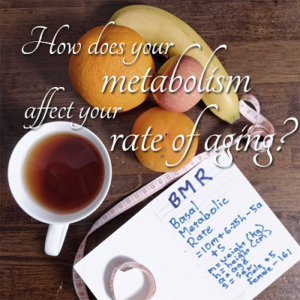 How does your metabolism affect aging? There is a great deal of conflicting information regarding metabolism, especially when it comes to delaying the effects of aging. Many people also tend to talk in absolutes, whereas good health and anti aging exists in a spectrum, rather than an absolute sweet spot.
How does your metabolism affect aging? There is a great deal of conflicting information regarding metabolism, especially when it comes to delaying the effects of aging. Many people also tend to talk in absolutes, whereas good health and anti aging exists in a spectrum, rather than an absolute sweet spot.
Metabolism is measured using your Base Metabolic Rate (BMR), which the amount of energy (calories) it takes to maintain your body at rest. Simply, someone with a higher BMR will burn more calories in the course of their day than someone with a lower BMR.
When people talk about ‘increasing your metabolism’ they mean that you will utilize more calories while expending the same energy. If caloric input does not increase when BMR is raised the body will store less fat and will even use body fat for energy if needed. This makes increasing ‘metabolism’ attractive for those wishing to lose weight.
However, some researchers believe, with statistics to support their belief, that the slower your metabolism is, the slower you age. The premise is that if you have a fast metabolism you are using lots of energy. If you are using lots of energy, you are also wearing things out.
A useful analogy is a motor car. If it drives slowly (low BMR) it reaches its destination (end of life) more slowly (anti aging) with more fuel (body fat) in the tank.
Unfortunately, this is more simplistic than a human life is and does not incorporate the variables that make the difference. For example, the low-BMR/longer life theory is largely predicated on the fact that the higher BMR utilizes increased oxygen which increases the creation of free radicals, which it does.
The inference then is that this increased free radical activity will increase cell damage, causing the body to wear out or age faster. However, if the body has adequate antioxidant support from consistently good dietary sources, it can deal very well with these free radicals, unless the body is under extreme stress.
If your goal is quality of life, longevity and helping your body look and feel younger than its years, you would do well to not focus too much on the theoretical debate about metabolism.
Instead, follow these health-sustaining directives:
Drink Lots of Water
Water increases your metabolism, helps you lose excess weight and keep the weight off. People who prefer fizzy soft drinks have a slower metabolism than those who drink water. Drinking plenty of water throughout the day allows your body to burn more calories and gets nutrients and antioxidants to the cells where they are needed.
Exercise Regularly
Exercise is another safe way to increase your metabolism in a healthy way. Through exercise your stored calories are used, or burned, while at the same time your muscle mass increases.
The result is an increased overall calorie expenditure. The bonus is that exercise is perfect for your health and preventing age related diseases. Exercise is perfect for your longevity. Choose exercise that does not take you to the point of exhaustion and avoid high-impact sports.
A lack of exercise will increase the chances of suffering from depression, anxiety and chronic degenerative diseases.
Observe Healthy Eating Habits
Another way to boost your metabolism and/or to keep your metabolism within normal levels is to eat healthy foods. A diet based on healthy protein and vegetables and fruits will prevent feelings of hunger and will deliver the broad range of antioxidants that are your magic bullets in the anti aging war.
Avoid Sugar
Avoid sugar and foods containing sugar and kick any sugar habit you may have. Whether it is white sugar, refined sugar, white starch or fructose corn syrup – these are all ‘metabolism killers’.
Banish cakes, fast foods, sauces and foods containing high fructose corn syrup (HFCS). If you continually eat these types of foods, you are losing the fight against aging. You will be far more susceptible to all the diseases related to aging, which are mostly more related to lifestyle.
So, if you want to avoid the premature signs of aging, stick to a high-nutrient and low-calorie intake, as your metabolism will neither be too slow nor too fast and it will keep your body in a healthy state, for a longer life.






